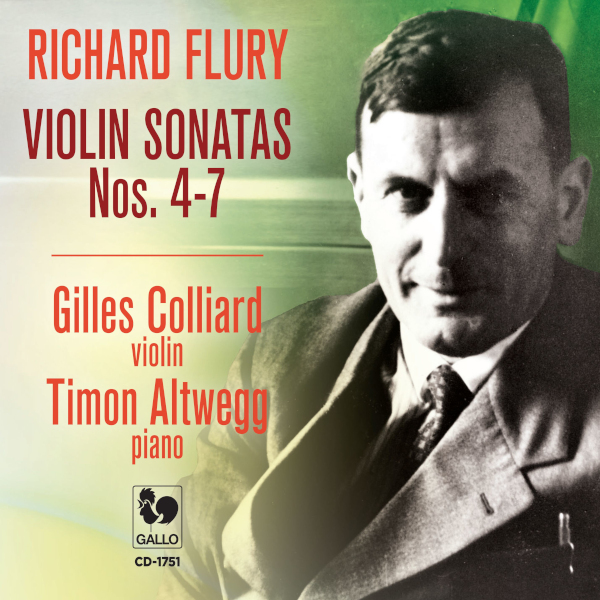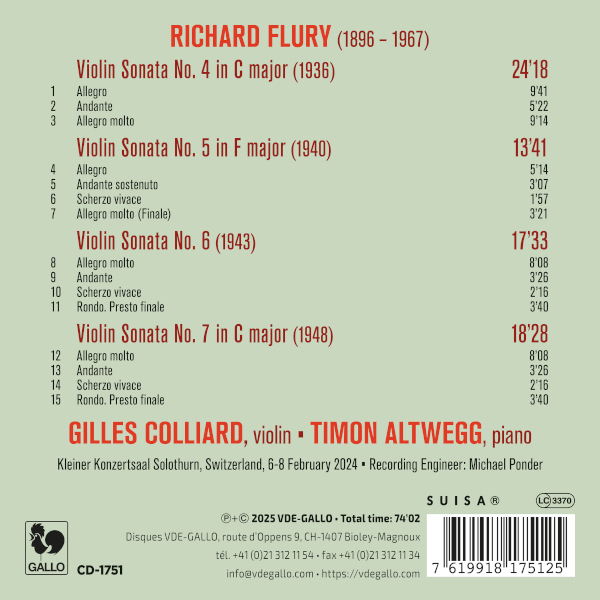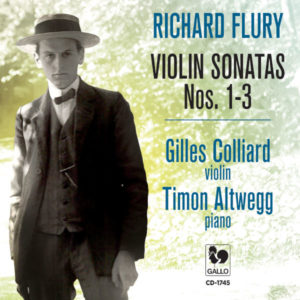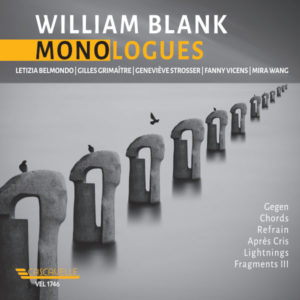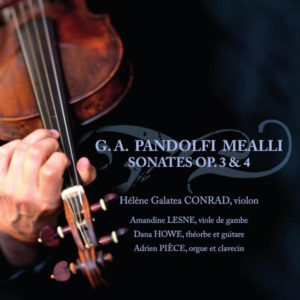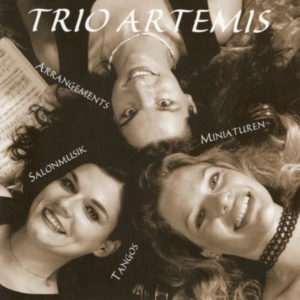Extraits / Excerpts
Richard Flury: Violin Sonatas Nos. 4-7 - Gilles Colliard, Violin - Timon Altwegg, Piano
Richard FLURY: Violin Sonata No. 4 in C Major: I. Allegro – II. Andante – III. Allegro molto – Violin Sonata No. 5 in F Major: I. Allegro – II. Andante sostenuto – III. Scherzo vivace – IV. Allegro molto (Finale) – Violin Sonata No. 6: I. Allegro molto – II. Andante – III. Scherzo vivace – IV. Rondo. Presto finale – Violin Sonata No. 7 in C Major: I. Allegro molto – II. Andante – III. Scherzo vivace – IV. Rondo. Presto finale.
Gilles Colliard, Violin
Timon Altwegg, Piano
Richard Flury in outline
Richard Flury was born on March 26, 1896 in Biberist, Switzerland. His parents provided their child with a solid musical background from an early age. After successfully finishing secondary school in Solothurn, Flury studied Music, Art History and Philosophy for seven semesters at the Universities of Bern, Basel and Geneva. Concurrently he was a student at the conservatories of those three cities, where he attended the violin classes of Fritz Hirt, Alphonse Brun and Paul Miche. Flury also studied under Hans Huber (composition), Ernst Kurth (counterpoint), Joseph Lauber (instrumentation), Félix Weingartner (conducting) and finally with Joseph Marx in Vienna. Subsequently Flury was a violin teacher at the Municipal School and the State Secondary School in Solothurn.
For 30 years he conducted the Solothurn City Orchestra, and for several years during this time he was also the conductor of the Academic Orchestra in Zurich, the mixed choir «Harmonie» in Bern and the Orchestra Association in Gerlafingen. Sporadically Flury also had contracts as guest conductor for symphony concerts in Bern and Basel, as well as at the radio studios of Zurich and Lugano, concentrating there primarily on performances of his own works.
As a composer, Flury had definite leanings towards the Late Romantic tradition, developing new directions within the boundaries of tonality, although he was always intent on letting himself be led by his natural musical impulses and feelings. Music was for him a romantic form of art, a language of emotion, and he was adverse to purely constructivist ideologies. If indeed his compositions often show a strong contrapuntal treatment of themes, this always derives organically from an inner ebb and flow. Refusing eclectic compromises, Flury discovered and refined his own personal style, which is evident in his extremely imaginative harmonies and in the rhythmic development within his works.
These harmonies are especially interesting in his transparent and richly-contrasted orchestral works, which often bear impressionistic traces, and in which he even dares to approach the limits of tonality. The composer clearly reveals his education as a violinist in his treatment of the string instruments in all of his instrumental music. He considered this to be his main area of music, although he did leave behind a large number of vocal works. His many piano pieces betray a capable pianist, a composer with a deep feeling for piano texture.
Having spent most of his life as a music pedagogue in the provinces, Richard Flury was never accorded the acclaim he deserved for his works. His importance for music, however, was recognized by a large circle of prominent contemporary musicians, who wrote about him and also performed his works. Among these were W. Backhaus, P. Baumgartner, J. Bovet, P. Burkhard, P. Casals, L. Casella, E. Jaques-Dalcroze, G. Doret, W. Gieseking, R. Ginster, H. Huber, G. Kulenkampff, J. Lauber, F. Lehár, J. Marx, O. Nussio, H. Scherchen, O. Schoeck, M. Stader, R. Strauss, J. Szigeti and F. Weingartner.
Two of Flury’s main works, the «Fastnachtssymphonie» and the «Waldsymphonie», were performed during his life in the European music centers of Vienna, Dresden, Frankfurt and Valencia, as well as in Kobe, Japan.
In 1950 the Publisher Habegger published Flury’s “Memoirs”, and in 1964 he was presented with the Art Prize of the Canton of Solothurn. The composer died on December 23, 1967 at the place of his birth, Biberist.
In 2017, on the 50th anniversary of Flury’s death, Toccata Press published a biography by Chris Walton entitled Richard Flury : The Life and Music of a Swiss Romantic, which includes a work catalogue that proves him to have been one of Switzerland’s most prolific composers, working in all genres of music from operas and symphonies to ballet, instrumental concertos, sacred and secular vocal works, chamber music and songs. This catalogue can be downloaded from the website www.richardflury.ch, which offers much more information on the composer.
Urs Joseph Flury
- Categories
- Composers
- Interprets
- Booklet
